About ICPC
The Independent Chinese PEN Center (ICPC) is a non-political, non-profit organization of writers that fights for the protection of freedom of expression and publication, and works toward ensuring the free flow of information, a prerequisite for a truly open society.More
Monthly Posts
- 2025 年 7 月 (1)
- 2024 年 7 月 (1)
- 2024 年 3 月 (1)
- 2023 年 4 月 (3)
- 2022 年 10 月 (1)
- 2022 年 7 月 (1)
- 2021 年 1 月 (3)
- 2020 年 12 月 (2)
- 2020 年 11 月 (2)
- 2020 年 9 月 (4)
- 2020 年 8 月 (1)
- 2020 年 7 月 (1)
- 2020 年 6 月 (5)
- 2020 年 5 月 (2)
- 2020 年 4 月 (1)
- 2020 年 3 月 (3)
- 2020 年 2 月 (5)
- 2020 年 1 月 (11)
- 2019 年 12 月 (2)
- 2019 年 11 月 (6)
- 2019 年 10 月 (4)
- 2019 年 9 月 (4)
- 2019 年 8 月 (3)
- 2019 年 7 月 (5)
- 2019 年 6 月 (14)
- 2019 年 5 月 (1)
- 2019 年 4 月 (1)
- 2019 年 3 月 (3)
- 2019 年 2 月 (2)
- 2019 年 1 月 (4)
- 2018 年 10 月 (4)
- 2018 年 9 月 (1)
- 2018 年 8 月 (1)
- 2018 年 7 月 (2)
- 2018 年 6 月 (3)
- 2018 年 5 月 (1)
- 2018 年 4 月 (2)
- 2018 年 3 月 (2)
- 2018 年 2 月 (4)
- 2018 年 1 月 (2)
- 2017 年 12 月 (2)
- 2017 年 11 月 (3)
- 2017 年 10 月 (1)
- 2017 年 6 月 (1)
- 2017 年 5 月 (3)
- 2017 年 3 月 (27)
- 2017 年 2 月 (24)
- 2017 年 1 月 (33)
- 2016 年 12 月 (24)
- 2016 年 11 月 (27)
- 2016 年 10 月 (29)
- 2016 年 9 月 (31)
- 2016 年 8 月 (31)
- 2016 年 7 月 (30)
- 2016 年 6 月 (26)
- 2016 年 5 月 (30)
- 2016 年 4 月 (27)
- 2016 年 3 月 (33)
- 2016 年 2 月 (26)
- 2016 年 1 月 (32)
- 2015 年 12 月 (36)
- 2015 年 11 月 (34)
- 2015 年 10 月 (41)
- 2015 年 9 月 (36)
- 2015 年 8 月 (37)
- 2015 年 7 月 (37)
- 2015 年 6 月 (39)
- 2015 年 5 月 (39)
- 2015 年 4 月 (39)
- 2015 年 3 月 (30)
- 2015 年 2 月 (38)
- 2015 年 1 月 (37)
- 2014 年 12 月 (35)
- 2014 年 11 月 (46)
- 2014 年 10 月 (92)
- 2014 年 9 月 (159)
- 2014 年 8 月 (109)
- 2014 年 7 月 (123)
- 2014 年 6 月 (263)
- 2014 年 5 月 (185)
- 2014 年 2 月 (1)
- 2014 年 1 月 (2)
- 2013 年 11 月 (1)
- 2013 年 8 月 (1)
- 2013 年 6 月 (1)
- 2013 年 1 月 (1)
- 2012 年 12 月 (1)
- 2012 年 11 月 (1)
- 2012 年 10 月 (2)
- 2012 年 8 月 (1)
- 2012 年 7 月 (1)
- 2012 年 6 月 (1)
- 2012 年 4 月 (2)
- 2012 年 2 月 (1)
- 2012 年 1 月 (3)
- 2011 年 12 月 (7)
- 2011 年 11 月 (1)
- 2011 年 10 月 (1)
- 2011 年 9 月 (1)
- 2011 年 7 月 (16)
- 2011 年 6 月 (8)
- 2011 年 4 月 (2)
- 2011 年 3 月 (2)
- 2005 年 12 月 (1)
- 2004 年 7 月 (1)
Member’s Works
BEI Ling
CHEN Kuide
CHEN Pokong
DU Daobin
LIAO Tienchi
LIU Xiaobo
MA Jian
MEI Jing
MURONG Xuecun
TENG Biao
WU Chenjun
XIN Hong
XUE Di
YANG Lian
YU Jie
ZHANG Ci
ZHANG Yu
ZHENG Yi
ZHENG Zeng
Tag Archives: Mao Zedong
Lecturer Fired in China’s Shandong After he Criticized Chairman Mao
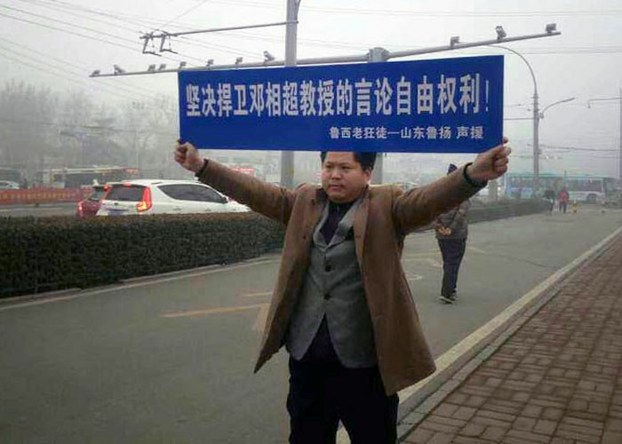
Poet Lu Yang holds up a sign supporting Deng Xiangchao, a professor who was fired by Shandong Jianzhu University for criticizing Mao Zedong, in the Shandong capital Jinan, Jan 4, 2017. Courtesy of Lu Yang.
Authorities in the eastern Chinese province of Shandong have terminated the contract of a university lecturer who criticized late supreme leader Mao Zedong, following protests and violent attacks on campus that were blamed on members of Maoist groups. Continue reading
Lecturer Fired in China’s Shandong After he Criticized Chairman Mao已关闭评论
Posted in Headlines, Internet Freedom
Tagged Deng Xiangchao, Jinan, Lu Yang, Mao Zedong, Shandong, violence
No Official Memorial For Chairman Mao, 40 Years After Death
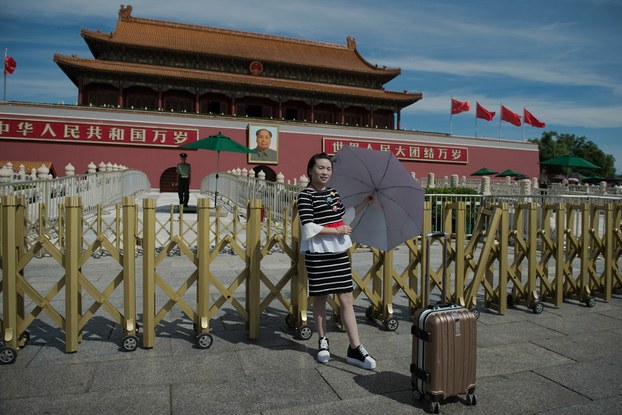
A woman stands in front of a giant portrait of Mao Zedong at the gate of the Forbidden City in Beijing on Sept. 9, 2016, the 40th anniversary of the death of Communist China’s founding father. AFP
Forty years after his death at the age of 82, late supreme leader Mao Zedong still presents a political dilemma to the ruling Chinese Communist Party. Continue reading
No Official Memorial For Chairman Mao, 40 Years After Death已关闭评论
Tagged death anniversary, Mao Zedong, Maoist
Exclusive: Australia’s two biggest cities cancel Mao Zedong concerts, citing safety concerns
| SYDNEY
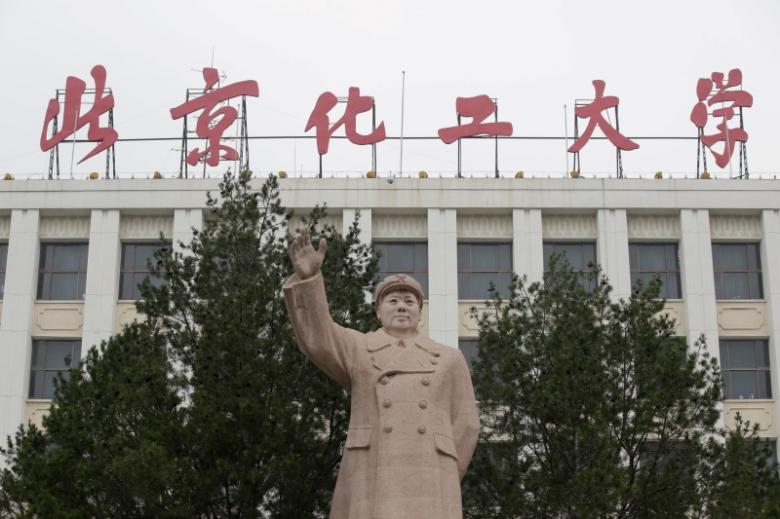
A statue of late Chairman Mao Zedong is pictured at Beijing University of Chemical Technology in Beijing, China, August 4, 2016. REUTERS/Jason Lee/File Photo
SYDNEY Australia’s two biggest cities Sydney and Melbourne canceled concerts commemorating the death of former Chinese communist leader Mao Zedong, with one citing safety concerns, after Chinese Australians complained the content was insensitive.
The incident signifies the continued divisiveness of Mao among Chinese, both at home and abroad, four decades after his death.
In China there is a quiet resurgence in popularity toward Mao, with his image adorning banknotes and his embalmed body attracting hundreds, if not thousands, of visitors a day to Beijing. But there is also continued criticism among Chinese of his reign, under which tens of millions died.
For weeks, Chinese in Sydney and Melbourne complained that the “Glory and Dream” concerts, scheduled for September in both cities’ town halls, lionize a leader they see as responsible for millions of deaths.
On Thursday, a spokesperson for the City of Sydney said in an email that after consulting police, the council had “concerns regarding the potential for civil disturbance, patron-to-patron conflict and staff-to-patron conflict” and canceled the event.
The spokesperson said the concert organizers, who booked the venue and arranged the concerts without council involvement, had also determined that the event was “at high risk of disruption and elevated risk to personal safety”.
A spokeswoman for City of Melbourne said the concert was also canceled in that city, but declined to give a reason saying it was the decision of the organizers.
An organizer of the events, Sydney property developer Peter Zhu, said in a telephone call that he was only the “sponsor” and declined to comment further. The other organizer, a group called the International Cultural Exchange Association, did not respond to emails and calls.
Mao, who died in 1976, remains a polarizing figure in China.
Source: http://www.reuters.com/article/us-australia-china-mao-zedong-exclusive-idUSKCN1173NZ
Concerts Honoring China’s Chairman Mao Spark Outrage in Australia
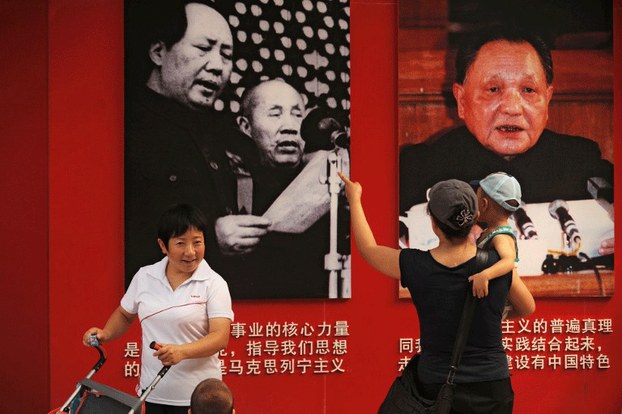
A mother (C) shows her child pictures of former communist party leaders Mao Zedong (top L) and Deng Xiaoping (top R) in Ditan Park in Beijing, June 28, 2011. AFP
Thousands of people have signed a petition to the Australian authorities to call off two concerts in honor of late supreme Chinese leader Mao Zedong, amid growing concerns over the lengthening reach of the Chinese Communist Party’s “soft power” influence overseas. Continue reading
Concerts Honoring China’s Chairman Mao Spark Outrage in Australia已关闭评论
Tagged Anniversary, Australia, concert, Mao Zedong, Melbourne, Sydney
New Book by Guobin Yang Explores the Red Guard Generation in China
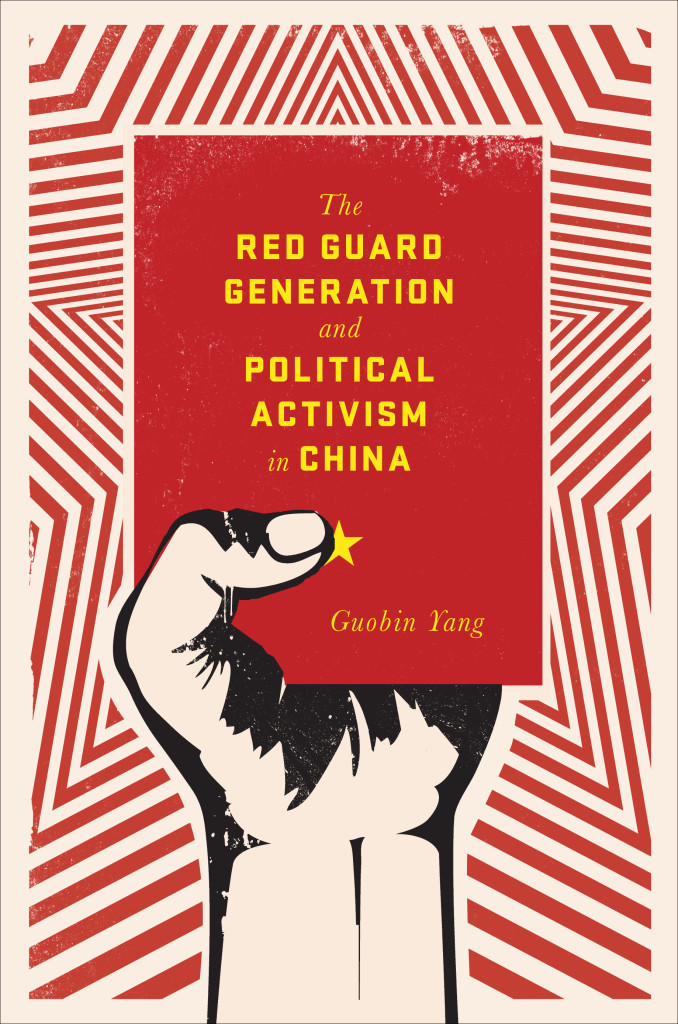 In 1966 — exactly 50 years ago this week — Communist Party Chairman Mao Zedong made a sweeping edict: China would purge its corrupt capitalist remnants and awaken to a new era of Communist ideology, true and pure. In heeding the call of the Cultural Revolution, China’s youth formed Red Guard groups whose fierce adherence to Maoist ideology drove them to engage in an uncompromising purge of anything Confucian, Western, or bourgeois. For several years, violence wracked China’s cities.
In 1966 — exactly 50 years ago this week — Communist Party Chairman Mao Zedong made a sweeping edict: China would purge its corrupt capitalist remnants and awaken to a new era of Communist ideology, true and pure. In heeding the call of the Cultural Revolution, China’s youth formed Red Guard groups whose fierce adherence to Maoist ideology drove them to engage in an uncompromising purge of anything Confucian, Western, or bourgeois. For several years, violence wracked China’s cities.
For young people coming of age at that time, life was profoundly different than that of generations before or since. In his new book, The Red Guard Generation and Political Activism in China, Professor Guobin Yang explores what happened to that generation and how their experiences shaped China for decades to come.
In the book, published by Columbia University Press, Yang argues that the forces that made the revolution also set in motion its undoing. After two years of fighting, millions of Red Guard were ordered by Mao to be “sent-down” to rural villages, partly as a means to control and curb the violence.
“The type of political culture they grew up in was one of loyalty to Mao, to the revolution, to struggle against class enemies, to the collective complete sacrifice of the self,” explains Yang, who is an Associate Professor of Communication and Sociology at Penn as well as a faculty member of the Center for the Study of Contemporary China and the Center for East Asian Studies. “But because of the violence, they had a sense of disillusionment. After all the fighting, nothing seemed to have been achieved.”
The sent-down youth were also woefully unprepared for the adjustment to rural life. They found rural China “backward” and were unprepared to become peasants. The revolution had used the slogan “Down with the self,” and considered real life personal concerns to be bourgeois. Yet, in one village, the village party secretary welcomed city youth’s arrival by telling them that “farming is for yourself.” The Red Guard generation was forced to think about its own day-to-day interests and came to appreciate the values of ordinary life rather than high-blown revolutionary ideals.
It was also the beginning of an underground culture as former Red Guards began to pick up their books again to re-educate themselves.
“They questioned the revolution and its meaning, gaining a new understanding of themselves, their society, politics,” says Yang. “Rural life was totally different than what they had learned in school before the Cultural Revolution.”
Such a generational transformation provides a foundation for both profound political and social change in China. Politically, Yang, says, the new outlooks of the Red Guard generation led to the first wave of popular protest for democracy from 1976 to 1980. This period marked the end of the Mao era and the beginning of the economic reform.
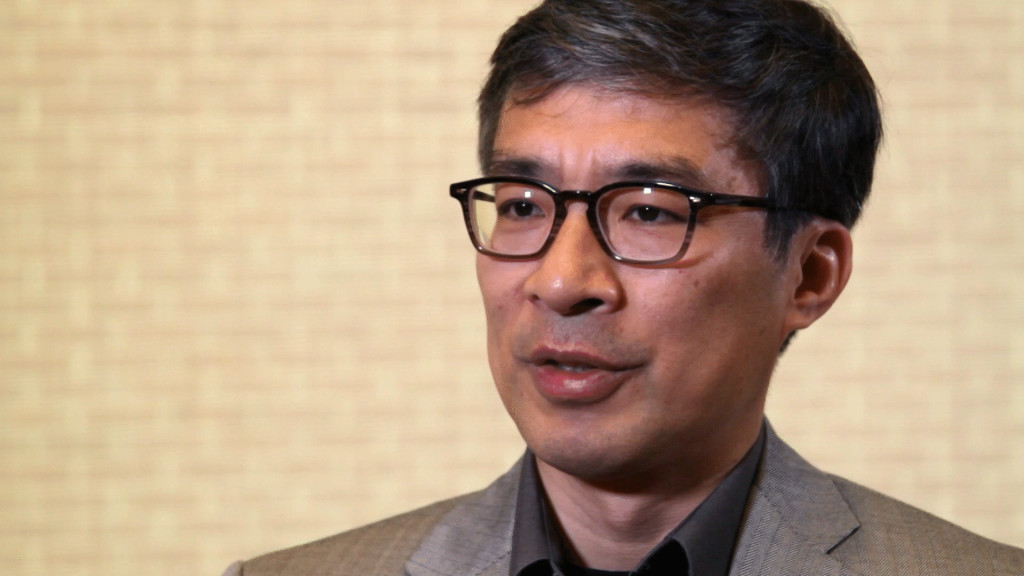
Guobin Yang, Ph.D.
In the book, Yang also makes a link from the sent-down youth to the beginning of economic reform in the late 1970s, which was a reversal of the Maoist planned economy. The government began to recognize private business, but faced resistance. Entrepreneurship had too long carried a moral stigma of dishonor.
“Because of the experience they had in the countryside, private enterprise was more acceptable to some members of the Red Guard generation,” says Yang. “Many of them had returned to the cities and couldn’t find jobs from the state. That understanding of personal interest and working for your own money and happiness had become acceptable to them. It laid a social foundation for the economic reform to take off. Otherwise it would have been harder to move from a planned to a market economy.”
In providing this new frame through which to view Red Guard activism, Yang concludes the book by looking at the politics of history and memory, arguing that the generation’s memories of that time often depend upon which side they happened to have been on 50 years earlier.
The release of Yang’s book, called “a major new study” by The Nation, coincided with the 50th anniversary of the beginning of the Chinese Cultural Revolution. As public debates about the contemporary ramifications of the Chinese Cultural Revolution exploded this month in the mainstream media, Yang’s book makes a timely scholarly contribution.
The Red Guard Generation and Political Activism in China is available now from Columbia University Press.
Source: https://www.asc.upenn.edu/news-events/news/new-book-guobin-yang-explores-red-guard-generation-china
New Book by Guobin Yang Explores the Red Guard Generation in China已关闭评论
Posted in Book Reviews, Calture Revolution
Tagged Cultural Revolution, Guobin Yang, Mao Zedong, Red Guard
Ma Jian: A Son of Cultural Revolution
Fifty years ago this month, Mao Zedong launched China’s Cultural Revolution – a decade of chaos, persecution, and violence, carried out in the name of ideology and in the interest of expanding Mao’s personal power. Yet, instead of reflecting on that episode’s destructive legacy, the Chinese government is limiting all discussion of it, and Chinese citizens, focused on the wealth brought by three decades of market-oriented reforms, have been content to go along. But at a time when President Xi Jinping is carrying out ruthless purges and creating his own cult of personality, burying the past is not cost-free. Continue reading
Ma Jian: A Son of Cultural Revolution已关闭评论
Tagged Cultural Revolution, Ma Jian, Mao Zedong, Xi Jinping
Joshua Fatzick: China Silent on 50th Anniversary of Cultural Revolution
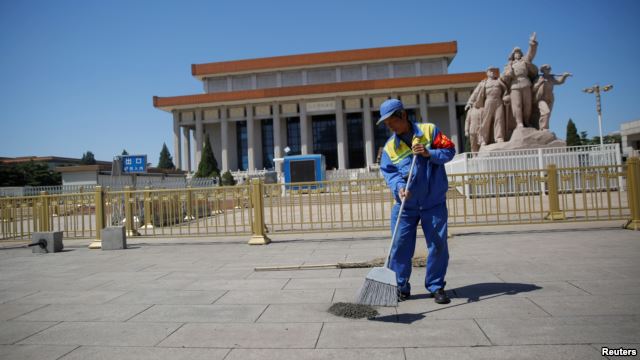
A cleaner sweeps ground in front of the Mausoleum of late Chinese chairman Mao Zedong at Tiananmen Square on the 50th anniversary of the start of the Cultural Revolution in Beijing, China, May 16, 2016.
Fifty years ago today, the Chinese Communist Party started the country down a path to the Cultural Revolution, which it said would bring about a more just society, but in practice led to complete social and economic disaster. Continue reading
Joshua Fatzick: China Silent on 50th Anniversary of Cultural Revolution已关闭评论
Posted in Culture, History, Press Freedom
Tagged censorship, Cultural Revolution, Joshua Fatzick, Mao Zedong
